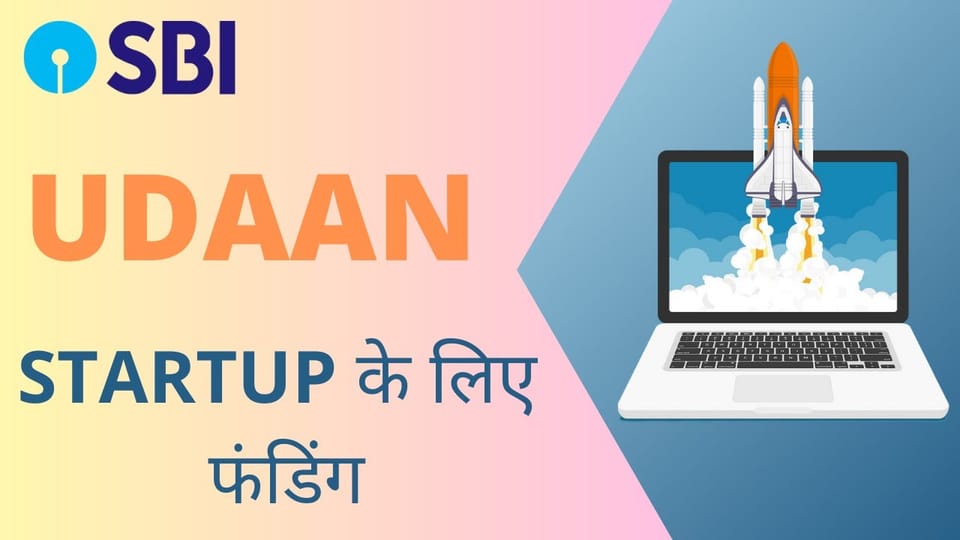SBI MSME Loans - MSME Loan Interest Rate SBI

- Getting financial support for start-ups is a constantly evolving process. With innovation and technological advancements, new financing opportunities are becoming available. State Bank of India (SBI) and MSME schemes like UDAN are playing an important role in strengthening the start-up ecosystem. These initiatives not only provide financial support to start-ups but also provide them with business advice, mentorship, and networking opportunities.
Going forward, start-ups should stay abreast of the latest financial products and services and tailor their financial plans to their particular business goals. Understanding financial management and selecting the right financial partners is extremely important for the success of start-ups.
Purpose:
- To provide financial assistance to DPIIT registered/recognized Start-ups for their various requirements like Prototype creation, product/website/app development, Team hiring, Legal and consulting services, Raw material and equipment, Licenses and certifications, Marketing and Sales, Purchase / Leasing of Office spaces and administrative expenses.
Features:
- Target Group: MSME Start-ups registered with / recognized by the Department for Promotion of Industry and Internal Trade (DPIIT), Govt. of India.
- Type of facility: Term Loan, Working Capital
- Quantum of Loan: Maximum Rs. 50 Crores categorized into two:
i. Up to Rs. 50 Lakhs
ii. Above Rs. 50 Lakhs – Rs. 50 Crores - Borrower’s Margin / Contribution:
- Loans up to Rs.10 lakhs: NIL
- Loans above Rs.10 lakhs: - Term Loan: As per the Debt: Equity specified.
- Working Capital: Min. 25% on Stocks & Receivables, if any.
Pricing/MSME Loan Interest Rate:
- Attractive Interest rates are based on the internal credit rating of the Borrower.
- At the discretion of the bank
- 50 bps (0.50%) concession in interest rates to women beneficiaries.
Repayment Period:
- Term Loan: Upto 120 months (incl. moratorium up to 36 months) / Bullet repayment
- Working Capital: Repayable on demand
In the context of finance and startups, here are some important points to consider:
Government Initiatives:
- Many governments around the world, including India, have various schemes and initiatives to support Micro, Small, and Medium Enterprises (MSMEs). These initiatives may include financial support, subsidies, and mentorship programs.
Startup Ecosystem:
- Explore the startup ecosystem in your region. There may be angel investors, venture capitalists, or other funding sources specifically interested in supporting startups and small businesses.
Business Plan:
- Develop a detailed and well-thought-out business plan. This should include your business model, revenue streams, market analysis, and financial projections. A strong business plan is crucial when seeking financial support.
Networking:
- Attend networking events, conferences, and workshops related to startups and MSMEs. Building a strong network can open up opportunities for funding and partnerships.
Bank Loans and Financial Institutions:
- Traditional bank loans and financial institutions are also potential sources of funding. Ensure that your business plan is solid and that you meet the criteria for loan applications.
Angel Investors and Venture Capital:
- Angel investors and venture capitalists often invest in promising startups. Prepare a compelling pitch and reach out to potential investors who have an interest in your industry.
Crowdfunding:
- Explore crowdfunding platforms where individuals contribute smaller amounts of money to fund your business. This can be an effective way to raise capital while also gaining public support for your venture.
MSME UDAAN or Similar Programs:
- If "MSME UDAAN" refers to a specific program or initiative, investigate its offerings and eligibility criteria. These programs may provide financial assistance, mentorship, or other support to MSMEs.
Apply For MSME Loan Schemes in SBI -
- To apply for MSME loan schemes in SBI, visit the official SBI website or your nearest SBI branch. First, choose the appropriate loan scheme that suits your business needs, such as the SME Term Loan, Working Capital Loan, or Micro and Small Enterprise Loan. Gather necessary documents, including business registration, financial statements, and identification proof. Fill out the loan application form with accurate details. After submission, the bank will assess your eligibility, financial history, and business plan. Once approved, the loan amount will be disbursed to your account to support the growth and expansion of your business.
FAQs:
What is the MSME scheme?
- The Ministry of Micro, Small, and Medium Enterprises (MSME) of the Government of India has implemented a cluster development approach as a central strategy to boost the productivity and competitiveness of Micro and Small Enterprises (MSEs) in the country. This approach focuses on capacity building and fostering collaboration among enterprises and their collectives, enabling them to leverage resources, share knowledge, and enhance their overall performance. By promoting cluster development, the MSME Ministry aims to create a supportive ecosystem that encourages growth and innovation within the sector.
Who is eligible for an MSME loan?
MSME loans are accessible to a wide range of applicants, including:
- Individuals seeking to start or expand a business
- Startups looking for initial funding
- Self-employed professionals and entrepreneurs
- Business owners operating various types of enterprises
- Micro, Small, and Medium Enterprises (MSMEs)
- Sole proprietorships for individual business ventures
- Private and public limited companies needing capital
- Partnership firms engaged in collaborative business efforts
- Limited Liability Partnerships (LLPs) requiring financial support
This diverse eligibility ensures that various business structures can benefit from MSME loans to enhance their operations and growth.
Who is eligible for MSME?
- An individual cannot apply for MSME registration on their own. Instead, eligibility for MSME registration is granted to various business entities, including:
- Proprietorships
- Partnership firms
- Companies
- Trusts
- Societies
To qualify, these entities must have an investment of less than ₹50 crore and an annual turnover below Rs. 250 crore. This framework allows diverse business structures to register as MSMEs, enabling them to access various benefits and support provided by the government.
What are the eligibility criteria for SBI Start-up Loan?
The eligibility criteria for an SBI Start-up Loan typically include:
- The applicant should be an Indian resident.
- The start-up should be recognized by the Department for Promotion of Industry and Internal Trade (DPIIT).
- The business must be within the banking sector's lending norms, showing innovation and scalability.
- A detailed business plan must be submitted, showcasing the nature of the product/service, market potential, and financial projections.
- The age and revenue criteria may vary depending on the specific loan product offered by SBI for start-ups.
What documents are required while applying for an SBI start-up loan?
When applying for an SBI start-up loan, you will typically need to provide the following documents:
- Duly filled loan application form: Specific to the start-up loan product being applied for.
- Proof of Identity: PAN Card, Aadhaar Card, Passport, Driving License, etc.
- Proof of Address: Recent utility bills, Passport, Aadhaar Card, etc.
- Proof of Business Address: Lease agreement, utility bills in the name of the business, or any other government-recognized document.
- Business Registration Documents: Certificate of Incorporation, GST registration, Partnership deed, or any other document proving the legal existence of the business.
- DPIIT Recognition Certificate: For the start-up to be recognized under the Start-up India initiative.
- Business Plan: Detailed document outlining the business model, market analysis, projections, product/service information, and scalability.
- Bank Statements: Personal and business bank statements for a specified period, usually the last 6 months to 1 year.
- Financial Documents: Audited financial statements for the last 2-3 years (if applicable), projected financial statements for the next 2-5 years, and ITRs of the promoters.
- Proof of Qualification: Educational and professional qualification certificates of the promoters.
- Other documents: Any other documents as requested by the bank, which could include legal documents, technical evaluations, or industry certifications relevant to the start-up.
What is the interest rate for an SBI start-up loan?
- The interest rate for SBI start-up loans varies based on the loan product, applicant's creditworthiness, and business specifics. It's advisable to check directly with SBI or their official website for the most current rates. it generally ranges from 8.3% to 16% per annum.
What is the MSME UDAN scheme and how do start-ups benefit from it?
- The MSME UDAN scheme is a government initiative aimed at fostering growth, skill development, and innovation among micro, small, and medium enterprises (MSMEs) in India. Start-ups benefit from it through easier access to finance, mentorship programs, market access, and support in navigating regulatory processes, thereby enhancing their growth potential and competitiveness.
How long does the process of getting an SBI start-up loan take?
- The processing time for an SBI start-up loan can vary, typically ranging from a few weeks to a couple of months. It depends on the completeness of the documentation, the complexity of the business proposal, and the due diligence process. Applicants can expedite the process by providing comprehensive and accurate documentation upfront.
What is the repayment period for the SBI Start-up Loan?
- The repayment period for SBI Start-up Loans can vary depending on the specific loan product and the nature of the business, but it generally ranges from 3 to 7 years. Some loans may offer a moratorium period where only interest is paid, and principal repayment begins after this period ends.
We hope that you like this content and for more such content Please follow us on our social site and YouTube and subscribe to our website.
Manage your business cash flows and payable/receivables using our Bahi Khata App




Comments ()